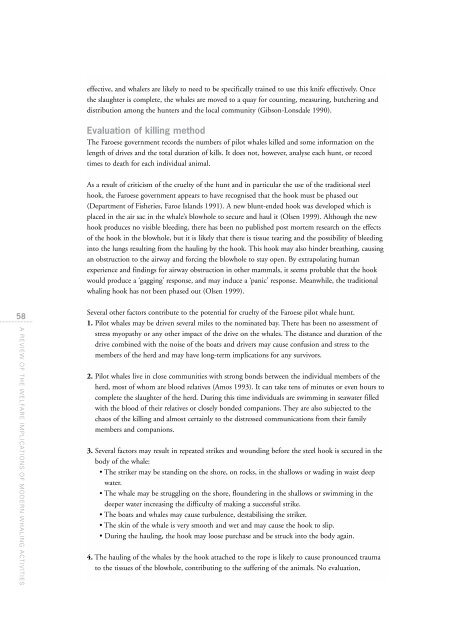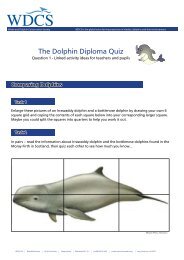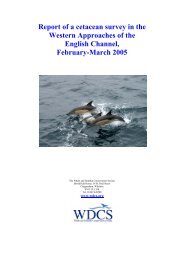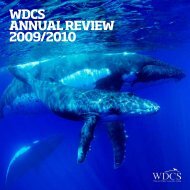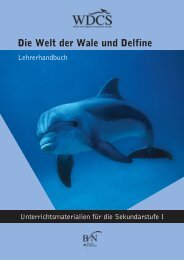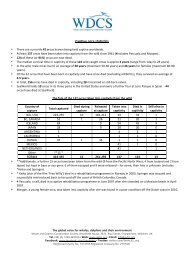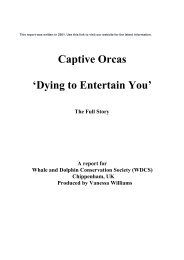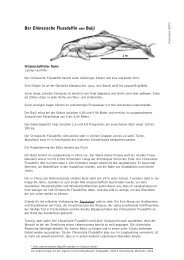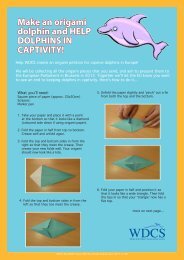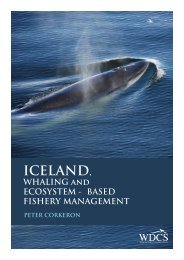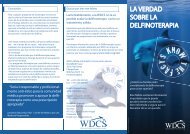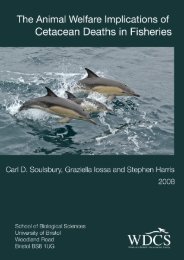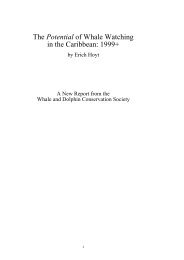TROUBLED WATERS - Whale and Dolphin Conservation Society
TROUBLED WATERS - Whale and Dolphin Conservation Society
TROUBLED WATERS - Whale and Dolphin Conservation Society
Create successful ePaper yourself
Turn your PDF publications into a flip-book with our unique Google optimized e-Paper software.
58<br />
A REVIEW OF THE WELFARE IMPLICATIONS OF MODERN WHALING ACTIVITIES<br />
effective, <strong>and</strong> whalers are likely to need to be specifically trained to use this knife effectively. Once<br />
the slaughter is complete, the whales are moved to a quay for counting, measuring, butchering <strong>and</strong><br />
distribution among the hunters <strong>and</strong> the local community (Gibson-Lonsdale 1990).<br />
Evaluation of killing method<br />
The Faroese government records the numbers of pilot whales killed <strong>and</strong> some information on the<br />
length of drives <strong>and</strong> the total duration of kills. It does not, however, analyse each hunt, or record<br />
times to death for each individual animal.<br />
As a result of criticism of the cruelty of the hunt <strong>and</strong> in particular the use of the traditional steel<br />
hook, the Faroese government appears to have recognised that the hook must be phased out<br />
(Department of Fisheries, Faroe Isl<strong>and</strong>s 1991). A new blunt-ended hook was developed which is<br />
placed in the air sac in the whale’s blowhole to secure <strong>and</strong> haul it (Olsen 1999). Although the new<br />
hook produces no visible bleeding, there has been no published post mortem research on the effects<br />
of the hook in the blowhole, but it is likely that there is tissue tearing <strong>and</strong> the possibility of bleeding<br />
into the lungs resulting from the hauling by the hook. This hook may also hinder breathing, causing<br />
an obstruction to the airway <strong>and</strong> forcing the blowhole to stay open. By extrapolating human<br />
experience <strong>and</strong> findings for airway obstruction in other mammals, it seems probable that the hook<br />
would produce a ‘gagging’ response, <strong>and</strong> may induce a ‘panic’ response. Meanwhile, the traditional<br />
whaling hook has not been phased out (Olsen 1999).<br />
Several other factors contribute to the potential for cruelty of the Faroese pilot whale hunt.<br />
1. Pilot whales may be driven several miles to the nominated bay. There has been no assessment of<br />
stress myopathy or any other impact of the drive on the whales. The distance <strong>and</strong> duration of the<br />
drive combined with the noise of the boats <strong>and</strong> drivers may cause confusion <strong>and</strong> stress to the<br />
members of the herd <strong>and</strong> may have long-term implications for any survivors.<br />
2. Pilot whales live in close communities with strong bonds between the individual members of the<br />
herd, most of whom are blood relatives (Amos 1993). It can take tens of minutes or even hours to<br />
complete the slaughter of the herd. During this time individuals are swimming in seawater filled<br />
with the blood of their relatives or closely bonded companions. They are also subjected to the<br />
chaos of the killing <strong>and</strong> almost certainly to the distressed communications from their family<br />
members <strong>and</strong> companions.<br />
3. Several factors may result in repeated strikes <strong>and</strong> wounding before the steel hook is secured in the<br />
body of the whale:<br />
• The striker may be st<strong>and</strong>ing on the shore, on rocks, in the shallows or wading in waist deep<br />
water.<br />
• The whale may be struggling on the shore, floundering in the shallows or swimming in the<br />
deeper water increasing the difficulty of making a successful strike.<br />
• The boats <strong>and</strong> whales may cause turbulence, destabilising the striker.<br />
• The skin of the whale is very smooth <strong>and</strong> wet <strong>and</strong> may cause the hook to slip.<br />
• During the hauling, the hook may loose purchase <strong>and</strong> be struck into the body again.<br />
4. The hauling of the whales by the hook attached to the rope is likely to cause pronounced trauma<br />
to the tissues of the blowhole, contributing to the suffering of the animals. No evaluation,


